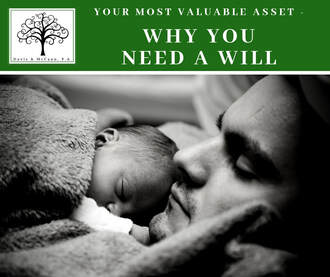 Having a will is the most basic step you can take in planning your estate. Without this document in place at your death, your State law dictates how to divide your material possessions, who will care for your minor children (in the absence of a surviving spouse), what age those children will receive access to their inheritance, and who will be responsible for selling or distributing your items of value. Despite these facts, nearly six in 10 adults in the U. S. still do not have a will, according to a 2017 Caring.com survey conducted by Princeton Survey Research Associates International. According to the survey, 78% of millennials (ages 18-36), 64% of those ages 37 to 52 (Generation X) and over 40% of those ages 53 to 71 do not have a will. The problem, according to Megan L. McCann, estate planning attorney and partner at Davis & McCann, P. A., likely centers around two facts: One, young adults rarely consider the possibility of death and two, many people assume they have insufficient assets to require estate planning. According to McCann, most Americans undervalue the assets that must be sold or distributed at their death. “Regardless of your age or the size of your bank account, it is very important to have an estate plan in place. Decisions must be made about bank accounts, real estate, stocks and bonds, vehicles, jewelry, retirement accounts, insurance proceeds, securities dividends, and even pets. If you want a say on who will receive your assets and how and when they will receive them, putting a plan together is crucial.” According to the survey results, only 36% of parents with children under age 18 have prepared a will. If you have children, McCann says having a will is critical, if for no other reason than to name guardians for your minor children. “In the absence of a will where you appoint a guardian, the State will decide who should care for your children after your death,” McCann says, “Part of our responsibility as parents is to protect our children, arguably our most valuable assets, and provide a safe future for them. By naming a guardian in a will, you can control who will provide that protection and safety for your children, if you no longer can.” “Tragedy isn’t part of anyone’s life plan,” says McCann, “However, young adults, rich and poor, with and without small children, die every day. The real tragedy is that most of them fail to put a plan in place stating their desires for guardianship of their children and distribution of their assets. This leaves a tremendous burden on the surviving spouse or family.” For more information on Estate Planning, contact Davis & McCann, P. A., Dodge City, KS. We are members of Wealth Counsel, a national consortium of Estate Planning Attorneys and focus our practice on providing clients with the best legal advice on estate planning, Medicaid and Long-term Care Planning, Family Business/Small Business Succession Planning, Probate, Trust Administration, Real Estate Transactions, and related matters. Comments are closed.
|
NEWS YOU CAN USEDavis & McCann, P. A., Archives
April 2021
Categories
All
|

 RSS Feed
RSS Feed